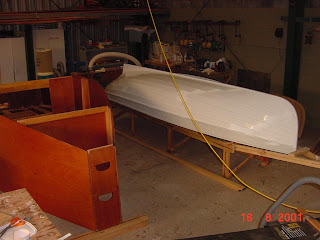 |
| A Phil Bolger Micro and an Iain Oughtred Tammie Norrie in the workshop I rented after first turning professional |
Ian lay against the wall of the workshop,
seated on an off-cut of plywood placed across a pair of sawhorses. He raised
his eyes from the jumble of boating magazines on his lap and contemplated the
scene within the building.
Mike Rowe was completing the final stages
of the scarph joint which had changed two sheets of 9mm plywood into a single
4.8metre panel. Ian had been able to watch the whole operation as though a fly
on the wall, his friend being almost unaware of another person in the shop.
What interested Ian was the speed with
which the scarphing operation had taken place, despite Mike having been
interrupted by a customer call.
“Hey Mike,” he called, “Do you realize that
you would have taken three weeks to do that job a few years ago, but that that
one took less than fifteen minutes?”
Mike Rowe glanced over at him as he tossed
a pair of disposable gloves into the bin and washed his hands in the grubby
wall-mounted sink. “The reason that I used to be so slow,” said Mike, “was that
I used to be frightened of making a mistake. I would plan the whole operation
(whatever it might be) in great detail, but the more I planned, the more
complicated it became in my head. Fear of wrecking the job really slowed me
down.”
Warming to the theme, Mike continued. “I’m
still concerned about making errors, but part of the learning process involves
understanding that mistakes and accidents will occur, but that just about
anything can be fixed properly.”
Having dragged his body away from the empty
coffee cup and stack of books, Ian cast a critical eye over the scarphing job.
He noted that although it was not perfect, it was neat and very accurate. The
feather-edge of the plywood scarph showed some unevenness where the razor-sharp
blade of the block plane had jagged the wood fibres – but these were minor
errors of no structural concern.
“It is the ‘average’ of the job which
matters, not the occasional fault,” observed Mike. “If you just keep trying to
be accurate and thorough, the job will work out well, despite the saw wandering
or the chisel slipping”.
Mike flicked on the kettle. “What used to
happen was that I’d become discouraged by mistakes. Then I would either walk
away for a week, or I would drop my standards because I thought the job was no
longer perfect.”
Nodding slowly, Ian reflected on the number
of times he had experienced the same feelings…
Let us leave this imaginary pair in the
imaginary workshop, but think about their story. Once you lose momentum on a
project, it is very difficult to get going again without encouragement.
Most amateur builders work alone, juggling
work, family, finances and time. A minor setback can seem disastrous, and it is
no wonder that some boatbuilding jobs are never completed. Others get finished,
but in a slap-dash manner because reality hasn’t matched the dream.
Don’t lose sight of the dream, but be
realistic about the outcome. As long as the wandering saw keeps coming back to
the line, the overall result will be good, and the care will show.
Attend to errors where they occur, but keep on working with accuracy in mind.


Good common sense advice for all amateur boat builders, including me!
ReplyDeleteA good post - I have just come out of a 7 month first build of a stich and tape canoe - I decided to build it as a practice run for a sail boat. I made a few mistakes and learnt a lot along the way about patience and having faith that it will come together. I spent waay to much time pondering the design and by and large my best work was when I commited to a course of action without too many time constraints. To be honest once it was built and i took it out on the water all that frustraion fell behind me. My wife has made me promise to complete a list of DIY tasks for her before i start on another project. Right now i miss that level of instense engagement between my self and materials. A few beers will sort that out :O)
ReplyDeleteThanks for posting this- it's precisely what I needed to read!
ReplyDelete